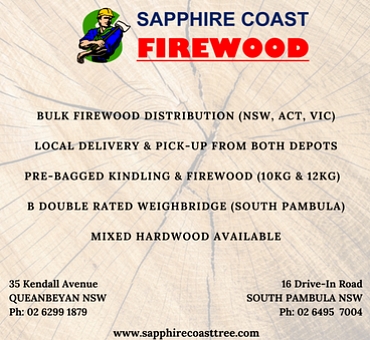Find a local firewood supplier
- Details
- Written by Support
- Category: Site Content
- Hits: 33855
There are many reasons why the commercial firewood supply industry needs a strong association. Firewood is not widely recognised as a renewable, carbon friendly energy source and its use is threatened by policy at all three levels of government. The image of firewood is not helped by the bad practices of some suppliers – illegal and unsustainable harvesting, selling green wood and selling short measure. Government departments, green groups, some health lobby groups and even the general public believe that cutting and burning firewood is bad for the environment.
Many problems threaten Australia’s firewood markets, as well as the industry’s supply base.
- New laws and government policies to protect biodiversity, even on private land. E.g. restrictive codes of practice for private native forestry, complex approval processes, controls over dead timber.
- Smoke pollution awareness campaigns, wood heater bans and phase out programs are being introduced by Councils with the support of some state EPA’s. Calls for wood heater bans are coming from various health lobby groups as well as The Greens who want to bring about an end to the harvesting of native timber species for firewood.
- Wood heater replacement incentive programs are sponsored by gas and electricity suppliers.
- Unfair price competition from casual sellers who do not have the overheads and other costs of legitimate practices of reputable businesses.
- Public perceptions that firewood is bad for the environment and a lack of knowledge about the greenhouse benefits of firewood as a source of renewable energy for heating.
The FAA provides the industry with a strong voice and the collective power to address these threats and to give its members a viable, long term future. Firewood is an efficient, renewable, sustainable and greenhouse friendly heating fuel. This environmental image is being actively promoted by the association. Member sales are directly assisted by the widespread use of the FAA website. The reputation of the industry is being improved by encouraging consumers to choose “sustainable firewood suppliers” who comply with a government endorsed industry Code of Practice.
The Firewood Association of Australia Inc. (FAA) is a not-for-profit incorporated association established in October 2005. Members of the firewood industry set up the association to improve the long-term sustainability of the firewood supply chain and to protect its members from the threats faced by the industry. The FAA has established itself as a point of contact and reference for government bodies, the media and other groups with an interest in the collection and use of firewood.
To be effective in achieving its aims the FAA needs a strong membership base of reputable firewood suppliers in all areas of Australia. By joining the FAA you can help to protect the future of the Australian firewood industry and achieve a healthy future for your business.
The Benefits of Firewood Association Membership
Increasing the demand for your firewood
- Full members of the Firewood Association of Australia (FAA) are entitled to use the FAA member logo, and can advertise as suppliers of “sustainable firewood”.
- Full FAA members will be recognised as the preferred suppliers of firewood to the rapidly expanding number of environmentally concerned consumers.
- Firewood retail outlets prefer to obtain their supplies from FAA accredited wholesalers.
- Searches for “firewood” in Google bring up the FAA web listing.
- Full FAA members are all listed as “Sustainable Firewood Suppliers” on the FAA web site www.firewood.asn.au
- The FAA refers all enquiries for firewood to the nearest FAA member.
Member services and contacts
- Membership provides you with numerous opportunities to improve supply chain relationships and develop strong contacts throughout the industry.
- The FAA provides advice on trade measurement practices and laws as they are applied in each state.
- The FAA provides free training on testing wood for moisture content.
- The FAA will assist members by providing representation on issues that threaten the industry such as resource access and smoke emissions.
- The FAA has relationships with organisations and departments that influence government policy on firewood collection and use.
- FAA members receive newsletters that provide a firewood industry perspective on issues of interest to the industry.
Membership qualification, member categories and costs
The FAA has set its fees to make membership affordable to all firewood suppliers. Application is free for all classes of membership. Applicants for full membership must be able to show that their firewood business complies with the elements of the National Code of Practice for Firewood Suppliers before their application is accepted. Annual membership fees range from $330 up to $990 for retail suppliers and from $550 up to $1,100 for wholesalers, depending on the annual quantity of a member’s firewood sales. Associate membership (for cutters, carters etc.) and affiliate membership (for wood heater manufacturer and retailers, or other interested stakeholders) is also available at $275 per annum.
If you would like an application form or if you want to know more, please contact the FAA by phone on 1300 131 481 or by e-mail This email address is being protected from spambots. You need JavaScript enabled to view it.. You can submit an on-line application via this link or we can post an application form to you in the mail.
- Details
- Written by Support
- Category: Site Content
- Hits: 53013
Solar Energy in a Stick!
Trees use photosynthesis to capture the sun's energy. Trees also absorb carbon dioxide from the atmosphere and use the solar energy captured to convert carbon dioxide and water into organic compounds such as cellulose to grow the tree. Oxygen is released to the atmosphere as a by-product of photosynthesis. In photovoltaic cells solar energy is directly converted into electricity, which can be fed into the grid or stored in batteries. In the leaves of trees solar energy is effectively stored in the organic compounds. When deposited into the trunk, roots and branches of a tree as wood this energy will be stored until the wood rots away, unless it is used as fuel.
Throughout our history mankind has used the stored solar energy in wood for heating, cooking and light. It is probably the historic use of fire to ward off the cold - and predators - that gives us all an ingrained feeling of comfort when we are close to a wood fire. It is only in comparatively recent times that man has started using other forms of stored energy called fossil fuels, ie. coal, gas and oil, to replace the use of wood. As we now know, the release of carbon dioxide from burning these previously inaccessible forms of hydrocarbons is changing the atmospheric concentration of carbon dioxide, which is thought to be causing an accelerated rate of change in the earth's climate. Obviously, the more use we can make of the stored solar energy contained in wood and other bioenergy sources, the less we need to use fossil fuels. As Patrick Moore, co-founder of Greenpeace stated in 2006; "One of the best ways to address climate change is to use more wood, not less. Wood is simply the most abundant, biodegradable and reusable material on the planet"
Firewood is not often recognised as "green" energy, probably because it comes from trees. But, unlike other sources of "green" energy, firewood does not need major capital investment or infrastructure. Every tonne of dry firewood contains approximately 20,000 Megajoules of stored energy. To understand how this stored energy compares to other forms of "green" energy, such as wind power generation, you need to convert the electricity produced from Megawatt hours into Megajoules. One Megawatt Hour equals 3,600 Megajoules. This means that a typical 660 kW wind turbine will generate around the same amount of energy in one year as that contained in 315 tonnes of firewood. Recent estimates (Driscoll et al 2000) place Australia's annual firewood consumption at around 4,000,000 tonnes. This is equivalent to the annual output of nearly 13,000 wind turbines or six large (550 MW) coal fired power stations.
The Climate Change Benefits of Firewood
A study of the greenhouse gas emissions of firewood was carried out by the CSIRO in 2003 for the Australian Greenhouse Office. The report from this study Life Cycle Assessment of Greenhouse Gas Emissions from Domestic Woodheating shows that firewood can release less carbon dioxide than all other sources of heat energy. In 2011 this study was updated to include the non-CO2 greenhouse gases, methane and carbon monoxide. This updated study found that the inclusion of these gases made little difference to the original findings. As stated in the 2011 report “What is the difference between emissions due to firewood collection for home heating and those which would have occurred anyway if the wood was left in the field to decompose or be burnt?" In fact firewood from plantations is greenhouse positive due to the carbon that is sequestered in the tree's root mass. In other words the tree absorbs more atmospheric carbon dioxide than is released when the wood from the tree's trunk is burnt. The reason that sustainable firewood is so good for the environment is that all of the carbon that is released during combustion is reabsorbed by trees as they grow. The only increase in atmospheric carbon dioxide comes from the fossil fuels used to process and transport the wood. It is worth noting that even "green" alternative energy generators such as wind farms, hydro stations and solar collectors create a lot of carbon pollution during manufacture and construction.
Protecting Biodiversity
By purchasing your wood from members of the FAA you can be confident that the wood has been harvested legally from sustainable sources and that biodiversity and threatened species have been protected. This is because compliance with the Voluntary Code of Practice for Firewood Merchants is a mandatory condition of membership in the FAA. The Code of Practice was developed by an Inter-Government Taskforce made up of representatives from the environment departments of all States, as well as the federal environment Department. Laws controlling the harvesting of firewood vary considerably from state to state, but all of them are designed to protect biodiversity. The federal Environment Protection and Biodiversity Control Act has an overarching role in the protection of threatened or vulnerable species habitat. In some states the harvesting of dead trees is exempt from native vegetation protection controls.
Carbon Sequestration
The CRC for Greenhouse Accounting and Forest and Wood Products Australia (FWPA) have published a good summary of the role of firewood and other forest products in the carbon cycle called Forests, Wood and Australia's Carbon Balance.
A short report titled Carbon Storage and Climate Change has been published by Vision 2020. It focuses on the carbon sequestration values of managed forests and plantations. The benefit of utilising residues and salvage from forestry operations as firewood is noted in the report as: "The use of wood waste in bio-fuels and for bio-energy is a further mechanism whereby plantations and native forest residues can be used to lower greenhouse gas emissions, by substituting for the use of fossil fuels"
No need to feel guilty
So, if you love a wood fire, whether for warmth, flavoursome food, or its' mood changing ambience, relax - because you are also doing the best you can for the environment.
- Details
- Written by Support
- Category: Site Content
- Hits: 2132001
The Firewood Association of Australia Inc. is a not for profit association established in 2005 to represent the commercial firewood supply industry in all states of Australia.
The purposes of the association are:
- To protect, enhance and improve the long-term sustainability of the Australian firewood industry;
- To promote association members as reputable suppliers of sustainable firewood under the Voluntary Code of Practice for Firewood Suppliers;
- To promote the use of firewood as a sustainable, greenhouse neutral alternative heating and cooking fuel;
- To facilitate communication between members of the Australian firewood industry;
- To represent members on issues affecting the firewood industry.
Application and qualification for membership is now FREE. To apply Click here .
If you are involved in the firewood industry and want to know why you should join Click here
To download a copy of The Code Practice Click here
- Details
- Written by Support
- Category: Site Content
- Hits: 35817
The Firewood Association of Australia was established in October 2005 to represent the Australian commercial firewood supply industry. The need for a whole of industry representative body was highlighted during the development of the government's Voluntary Code of Practice for Firewood Suppliers.
After the Code was accepted by the Natural Resources Management Ministerial Council the next step was to encourage its adoption by the firewood industry. Government policy was to encourage consumers to buy from the environmentally responsibility members of the industry who comply with the Code, and to reduce the environmental impact of unregulated self-collection and illegal harvesting. There are plenty of firewood sellers who create a negative image for the industry, by selling wet or incorrectly measured firewood, or by stocking environmentally unacceptable firewood.
To be a member of the FAA a firewood supplier must make a commitment to comply with the Code of Practice. Compliance to the Code is assessed by audit before FAA membership is granted.
The constitutional division of powers in Australia means that most legislation concerning the harvesting and sale of firewood is controlled by the individual states and their local governments. However, the federal government has an important role to play in the industry due to its administration of the Environment Protection and Biodiversity Conservation Act 1999 (EPBC Act) and also the National Trade Measurement Regulations 2009.
This complexity of legislation covering the industry, combined with the fact that firewood is often transported across state boundaries, makes it essential that the industry representative body is national. The firewood industry faces many political, environmental and commercial challenges that affect resource access and availability, wood heater regulation, wood smoke, industry image and consumer demand. The FAA is the only organisation that is working effectively to protect and grow the firewood industry.
There is clear evidence that firewood buyers are "choosing for the environment" by seeking out sustainable firewood suppliers, so FAA membership also provides strong and immediate commercial benefits. FAA members are promoted directly to consumers through this website and through a 1300 phone number.
FAA Membership
There are three categories of membership in the Association. Full members, Associate members and Affiliate members.
Full Members
Full membership of the Association is open to all persons and enterprises actively involved in the commercial firewood supply industry, including firewood cutters, firewood wholesalers, retail merchants and bagged or packaged firewood distributors. To be a full member of the Association a person or enterprise must comply with the Code of Practice for Firewood Suppliers. The following rights and benefits apply to full members:-
- Issued individual Member Number.
- Entitled to use individual sustainable firewood supplier logo in advertising, documentation and promotion.
- Web listing, opportunity to advertise and set up web-links.
- FAA promotion through the website, 1300 number responses and referrals, print media.
- Reviews and summaries of relevant legislation.
- FAA stakeholder relations, representations and statements on issues affecting the firewood industry.
- Access to website database.
- General member support and advice.
- Member networking opportunities.
- User-pays participation in specific industry benefit projects.
- Voting rights at general meetings. Entitled to serve as an office bearer on the Committee of Management.
For an application form click here.
Associate Members
Associate membership is open to all persons and enterprises involved in the commercial firewood supply industry. This membership category is suitable for persons or enterprises that wish to support their industry through the Association, but do not seek the benefits of being recognised as sustainable firewood suppliers. The following rights and benefits are provided for associates:-
- Use of associate logo.
- FAA stakeholder relations, representations and statements on issues affecting the firewood industry.
- Web listing and opportunity for sponsorship.
- Access to website database.
- General member support and advice.
- Member networking opportunities.
- Entitled to serve as an ordinary member on the Committee of Management.
For an Associate membership application form click here.
Affiliate Members
Affiliate membership of the Association is open to all persons and enterprises that are not directly involved in the commercial firewood supply industry, who wish to support the Association. The following rights and benefits are provided for affiliates:-
- Use of affiliate logo.
- Web listing, opportunity to advertise and set up web-links.
- FAA promotion through the website and print media.
- FAA stakeholder relations, representations and statements on issues affecting the firewood industry.
- Access to website database.
- General member support and advice.
- Member networking opportunities.
- User-pays participation in specific industry benefit projects.
- Entitled to serve as an ordinary member on the Committee of Management.
For an Affiliate membership application form click here.
For a copy of the Firewood Association of Australia Inc. Rules of association click here.
The FAA Management Committee
|
President |
Anthony Wilson |
Longburn Wood |
|
Vice President |
Peter Chauncy |
Best Burning Fire Fuels |
|
Secretary |
Paul Harriss |
Firewood Devils |
|
Treasurer |
Doug Schutz |
The Woodyard |
|
Member |
Michael Spillane |
The Green Centre |
|
Member |
Joel Belnick |
Jetmaster Fireplaces (Aust) |














